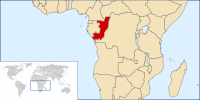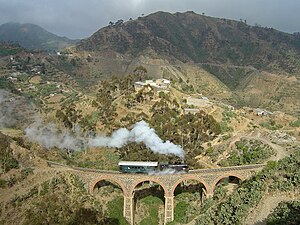Portal:Africa



Africa is the world's second-largest and second-most populous continent after Asia. At about 30.3 million km2 (11.7 million square miles) including adjacent islands, it covers 20% of Earth's land area and 6% of its total surface area. With nearly 1.4 billion people as of 2021, it accounts for about 18% of the world's human population. Africa's population is the youngest among all the continents; the median age in 2012 was 19.7, when the worldwide median age was 30.4. Based on 2024 projections, Africa's population will reach 3.8 billion people by 2099. Africa is the least wealthy inhabited continent per capita and second-least wealthy by total wealth, ahead of Oceania. Scholars have attributed this to different factors including geography, climate, corruption, colonialism, the Cold War, and neocolonialism. Despite this low concentration of wealth, recent economic expansion and a large and young population make Africa an important economic market in the broader global context. Africa has a large quantity of natural resources and food resources, including diamonds, sugar, salt, gold, iron, cobalt, uranium, copper, bauxite, silver, petroleum, natural gas, cocoa beans, and.
Africa straddles the equator and the prime meridian. It is the only continent to stretch from the northern temperate to the southern temperate zones. The majority of the continent and its countries are in the Northern Hemisphere, with a substantial portion and a number of countries in the Southern Hemisphere. Most of the continent lies in the tropics, except for a large part of Western Sahara, Algeria, Libya and Egypt, the northern tip of Mauritania, and the entire territories of Morocco and Tunisia, which in turn are located above the tropic of Cancer, in the northern temperate zone. In the other extreme of the continent, southern Namibia, southern Botswana, great parts of South Africa, the entire territories of Lesotho and Eswatini and the southern tips of Mozambique and Madagascar are located below the tropic of Capricorn, in the southern temperate zone.
Africa is highly biodiverse; it is the continent with the largest number of megafauna species, as it was least affected by the extinction of the Pleistocene megafauna. However, Africa is also heavily affected by a wide range of environmental issues, including desertification, deforestation, water scarcity, and pollution. These entrenched environmental concerns are expected to worsen as climate change impacts Africa. The UN Intergovernmental Panel on Climate Change has identified Africa as the continent most vulnerable to climate change.
The history of Africa is long, complex, and varied, and has often been under-appreciated by the global historical community. In African societies the oral word is revered, and they have generally recorded their history via oral tradition, which has led anthropologists to term them oral civilisations, contrasted with literate civilisations which pride the written word. During the colonial period, oral sources were deprecated by European historians, which gave them the impression Africa had no recorded history. African historiography became organized at the academic level in the mid-20th century, and saw a movement towards utilising oral sources in a multidisciplinary approach, culminating in the General History of Africa, edited by specialists from across the continent. (Full article...)
Selected article –
The Chilembwe uprising was a rebellion against British colonial rule in Nyasaland (modern-day Malawi) which took place in January 1915. It was led by John Chilembwe, an American-educated Baptist minister. Based around his church in the village of Mbombwe in the south-east of the colony, the leaders of the revolt were mainly from an emerging black middle class. They were motivated by grievances against the British colonial system, which included forced labour, racial discrimination and new demands imposed on the African population following the outbreak of World War I.
The revolt broke out in the evening of 23 January 1915 when rebels, incited by Chilembwe, attacked the headquarters of the A. L. Bruce Estates at Magomero and killed three white settlers. A largely unsuccessful attack on a weapons store in Blantyre followed during the night. By the morning of 24 January, the colonial authorities had mobilised the Nyasaland Volunteer Reserve (NVR) and called in regular troops from the King's African Rifles (KAR). After a failed attack by KAR troops on Mbombwe on 25 January, the rebels attacked a Christian mission at Nguludi and burned it down. The KAR and NVR captured Mbombwe without encountering any resistance on 26 January. Many of the rebels, including Chilembwe himself, fled towards Portuguese Mozambique, hoping to reach safety there, but many were captured. About 40 rebels were executed in the revolt's aftermath, and 300 were imprisoned; Chilembwe was shot dead by a police patrol near the border on 3 February. (Full article...)
Featured pictures –
Did you know (auto-generated) -

- ... that South African mayor Marlene van Staden was re-elected through a coin toss?
- ... that Freetown, Alabama, was founded by free and formerly enslaved African Americans in Alabama, whose church, built in 1929, burned down in 2022?
- ... that South African president Jacob Zuma requested a tour of a Sainsbury's supermarket during his state visit to the United Kingdom in 2010?
- ... that prior to becoming West Virginia's first African-American judge, Leon P. Miller was McDowell County's assistant prosecuting attorney, a Welch city councilman, and U.S. Attorney for the Virgin Islands?
- ... that land for a library built for African Americans in Virginia was donated by Pope Pius XII?
- ... that after anti-apartheid activist David Rabkin was sentenced to prison in South Africa, he gave the courtroom the clenched-fist black power salute?
Categories
Selected biography –
Kofi Atta Annan (/ˈkoʊfi ˈænæn/ KOH-fee AN-an, US also /- ˈɑːnɑːn/ - AH-nahn; 8 April 1938 – 18 August 2018) was a Ghanaian diplomat who served as the seventh secretary-general of the United Nations from 1997 to 2006. Annan and the UN were the co-recipients of the 2001 Nobel Peace Prize. He was the founder and chairman of the Kofi Annan Foundation, as well as chairman of The Elders, an international organisation founded by Nelson Mandela.
Annan joined the United Nations in 1962, working for the World Health Organization's Geneva office. He went on to work in several capacities at the UN Headquarters, including serving as the Under-Secretary-General for peacekeeping between March 1992 and December 1996. He was appointed secretary-general on 13 December 1996 by the Security Council and later confirmed by the General Assembly, making him the first officeholder to be elected from the UN staff itself. He was re-elected for a second term in 2001 and was succeeded as secretary-general by Ban Ki-moon in 2007. (Full article...)
Selected country –
 |
 |
||

| |||
The Republic of the Congo (French: République du Congo; Kongo: Repubilika ya Kongo; Lingala: Republiki ya Kongó), also known as Congo-Brazzaville, is a former French colony of western-central Africa. Upon independence in 1960, the former French region of Middle Congo became the Republic of the Congo. A quarter century of Marxism was abandoned in 1990 and a democratically elected government installed in 1992. A brief civil war in 1997 restored former Marxist President Denis Sassou Nguesso.
The Republic of the Congo borders the Democratic Republic of the Congo to the south and east, Gabon to the west, Cameroon and the Central African Republic to the north, and Cabinda (Angola) and the Gulf of Guinea to the southwest. The southwest of the country is a coastal plain for which the primary drainage is the Kouilou-Niari River; the interior consists of a central plateau between two basins to the south and north. The capital, Brazzaville, is located on the Congo River, in the south of the country, immediately across from Kinshasa, the capital of the Democratic Republic of the Congo. (Read more...)
Selected city –
Kisangani (/kiːsəŋˈɡɑːni/), formerly Stanleyville (Dutch: Stanleystad), is the capital of Tshopo Province, located on the Congo River in the eastern part of the central Congo Basin in the Democratic Republic of the Congo. It is the country's fifth-most populous urban area, with an estimated population of 1,602,144 as of 2016, and the largest of the cities in the tropical woodlands of the Congo.
Geographically, Kisangani is flanked by Banalia Territory to the north, Bafwasende to the east, Ubundu Territory to the south, and is bordered by both Opala and Isangi Territories to the west. The city spans an area of 1,910 square kilometers and is situated within the equatorial forest plain at coordinates 0°30' north latitude and 25°20' east longitude, just 80 kilometers from the equator. Kisangani is located approximately 2,100 kilometers (1,300 miles) from the mouth of the Congo River, making it the farthest navigable point upstream. (Full article...)
In the news
- 15 February 2025 – Kivu conflict
- Mass looting and sporadic gunfire is reported in Bukavu, Democratic Republic of the Congo, as M23 rebels advance into the city. Mobs loot several facilities, including a World Food Programme depot. (BBC News)
- The Congolese military withdraws from Bukavu heading south towards Tanganyika Province. (AP)
- General Muhoozi Kainerugaba, Chief of the Ugandan military, claiming to act with the authority of his father, President Yoweri Museveni, threatens to invade the Democratic Republic of the Congo and take control of Bunia, capital of Ituri Province, unless local forces surrender their weapons within 24 hours. Kainerugaba alleges that the Hema people are being killed. (Reuters)
- 15 February 2025 – Democratic Republic of the Congo–Rwanda conflict
- The Democratic Republic of the Congo's Minister of Foreign Affairs Thérèse Kayikwamba Wagner calls on Western sporting firms such as the National Basketball Association, Formula One and Arsenal F.C. to cut sponsorship deals with Rwanda amid the conflict in Kivu. (ESPN)
- 15 February 2025 – South Africa–United States relations
- Hundreds of White South Africans hold a protest outside the U.S. embassy in Pretoria, South Africa, in support of U.S. President Donald Trump's claims that the South African government is discriminating against the country's white minority. (AP)
- 15 February 2025 – 2025 African Union Commission Chairperson election
- Government leaders of the member states of the African Union elect Djiboutian foreign affairs minister Mahamoud Ali Youssouf as the organization's Chairperson, succeeding Chadian Moussa Faki. (AP) (Reuters)
Updated: 3:05, 16 February 2025
General images -
Africa topics
More did you know –
- ... that at approximately 5,000 years old, the Lothagam North Pillar Site is thought to be the earliest and largest monumental cemetery in eastern Africa?
- ... that a 2020 study found that African countries which allowed foreign funding of NGOs had a higher voter turnout?
- ... that Essop Moosa, who was of Indian origin, became the first non-white player to play for an all-white soccer team in South Africa, appearing under a pseudonym?
- ... that the Seventh German Inner Africa Research Expedition served as cover for a secret First World War espionage mission?
Related portals
Major Religions in Africa
North Africa
West Africa
Central Africa
East Africa
Southern Africa
Associated Wikimedia
The following Wikimedia Foundation sister projects provide more on this subject:
-
Commons
Free media repository -
Wikibooks
Free textbooks and manuals -
Wikidata
Free knowledge base -
Wikinews
Free-content news -
Wikiquote
Collection of quotations -
Wikisource
Free-content library -
Wikispecies
Directory of species -
Wikiversity
Free learning tools -
Wikivoyage
Free travel guide -
Wiktionary
Dictionary and thesaurus

























































































